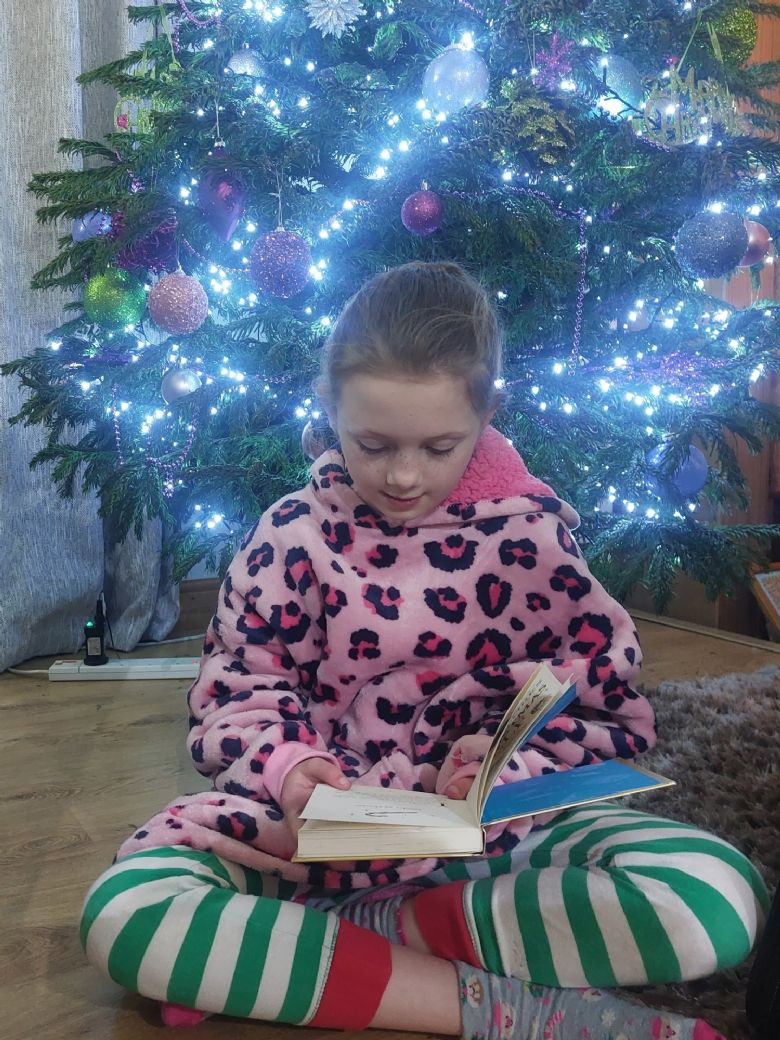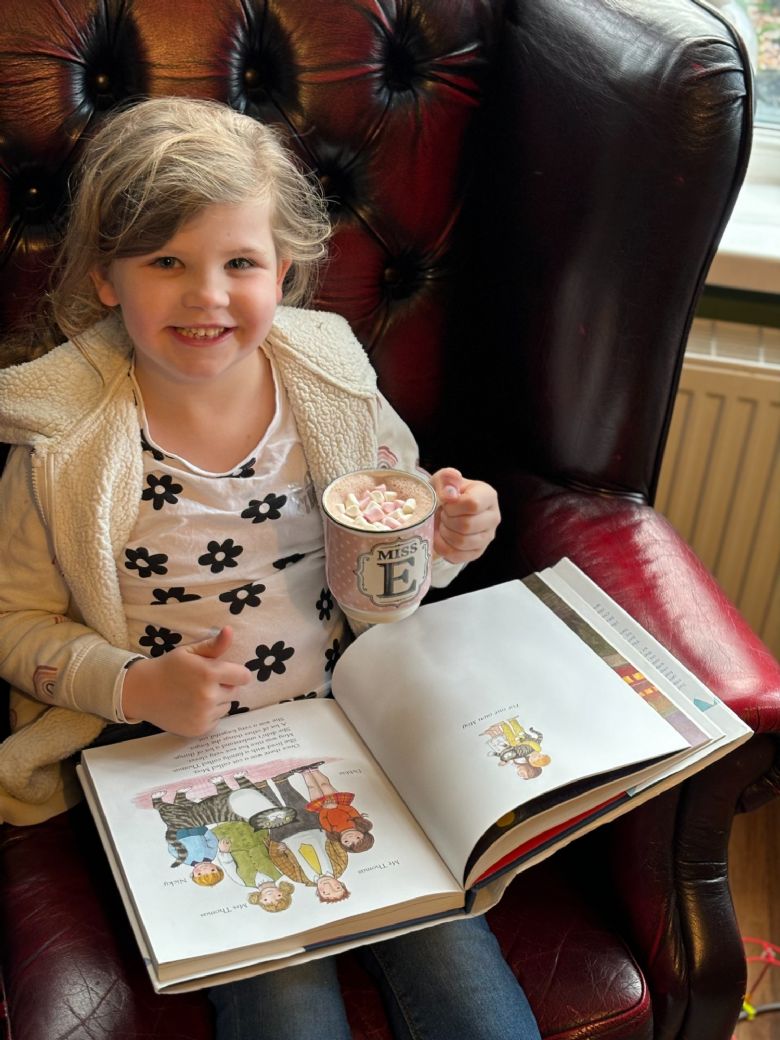Reading
Reading is our Super Power
We all love reading stories and poems to our class and love to share our own favourite stories with the children.
Every Christmas we have a pyjama and book day. The children come to school in their p.j.'s, bring a favourite book and get the opportunity to share their books with their friends.
All the children are placed into mixed aged groups; they, then, move around the school listening to stories brought in by each member of staff. It is always great fun and is enjoyed by all. At the end of the day, they get a hot chocolate with cream and marshmallows.
Holiday Reading Challenge
During every school holiday of 2 or more weeks, we send home a reading challenge - with dojos as a reward for completing it.
Here are some photos of our children reading in unusual places.


Intent
All children will leave Rowsley CofE as a reader; a child who reads for pleasure and a child who has developed a love of books as well as having a knowledge and understanding of a range of authors, stories, poems and non-fiction. At Rowlsey CofE, we know that the teaching of reading is integral to a child’s understanding and appreciation of the world around them; a platform that allows our children to see beyond what they know, share in cultural experiences and develop the vocabulary they need to effectively express themselves. We offer a wide range of stories, poems and non-fiction texts which give the children the opportunity to read and learn about the lives of those whose experiences and perspectives differ from their own thus giving the children the opportunity to explore differences, break down divisions and prejudices.
Our reading curriculum strives to foster a lifelong love of reading and an understanding that we read for pleasure as well as reading to gain knowledge in other areas of the curriculum through high quality non-fiction texts. We aim to cultivate the behaviours that they will need to be discerning readers as they read frequently and widely and discuss what they read with their peers and adults both at home and at school.
Children learn to read through a thorough synthetic phonics scheme (Little Wandle), a school-wide approach to shared and guided reading, home reading – reading scheme linked to phonics up to Lime level and a Reading Challenge Scheme created using high quality texts including poetry and non-fiction, reading across the curriculum, opportunities for independent reading and the hearing of quality texts in story time sessions. All of these are essential components as they offer the range of opportunities needed to develop fluent, enthusiastic and critical readers.
The staff at Rowsley CofE want the children to realise that reading is for pleasure, knowledge and good for our mental well-being.
We understand the significance of parents and carers in supporting their children to develop both word reading and comprehension skills so we endeavour to build a home-school partnership which enables parents and carers to have the confidence to support their children with reading at home.
Reading is at the very heart of our curriculum. We are committed to promoting a love for reading and not only provide opportunities to read in English lessons, but in the wider curriculum too.
Good story tellers are essential at Rowsley CofE Primary.
Implementation
Early Years & KS1
Reading is one of the most important things that children will learn at Rowlsey CofE Primary School. Our aim is for every child to be able to learn to read as well as being able to read to learn. This means they will be confident and fluent readers who have learnt to read by the end of KS1 and be starting to read to learn by gaining knowledge in other subjects through reading.
Reading underpins everything else, so the staff at Rowsley CofE put as much energy as possible into making sure that every single child learns to read as quickly as possible. We want our children to develop a real love of reading and to want to read for themselves.
We start by teaching phonics in the Foundation Stage and Key stage 1 using the accredited Little Wandle Scheme. Little Wandle is a brilliant resource that is purposeful, visually appealing and engaging for our children. It ensures high quality consistent teaching of phonics and early reading for every child and helps our children you continue to grow a love of reading in your school. The reading scheme in Early Years, KS1 and start of KS2 is matched up carefully with the letters and sounds being taught. New books were acquired following the flood of 2019.
The Early Years/KS1 practitioners complete regular individual assessments of phonics which inform the rate at which the children are able to progress through the phases. They adapt their pace accordingly, immerse the children through the learning environment to aid in the learning of high frequency words i.e. high frequency word dinner mats, and we practice the phonics daily through small focused groups and activities. The children are assessed on their phonics as soon as they enter our Reception Class and we always start the year with a recap of Phase 1 as we know how important listening skills are and we appreciate that not all children have had the same opportunities before entering school.
In Reception, we revise all letter sounds and learn new digraphs and trigraphs. As the children become more confident with segmenting and blending sounds, they are encouraged to read whole words. In the Reception class children are also taught words with 4 and 5 sounds in them and alternate ways to read and write different sounds. This continues into Year 1, 2 and 3 as appropriate and children learn to read and write a range of graphemes and alternate graphemes.
Discreet phonic teaching sessions take place daily for 15 - 20 minutes and there are also enhanced phonic activities within the indoor and outdoor environment available for the children to explore independently throughout the day – (in the EYFS and KS1 year groups).
Our assessment of the EYFS/KS1 pupils since Covid lockdowns has revealed gaps in their phonics knowledge and reading ability, we have therefore introduced intervention groups where those identified are given the opportunity to bridge those gaps. Experienced and trained adults also come in on a weekly basis to hear readers on a one to one basis.
All children are sent home with a reading book matched to their phonics, we encourage children to read this to their parents more than once so they gain a better understanding of the sounds and high frequency words within the text.
From Year 1, children also take home a book linked to our reading for pleasure/reading challenge scheme.
Whole School and KS2
Reading is a high priority in all classes and additional adults (volunteers) do come in and hear all children read with an emphasis being on those in the bottom 20%.
In all classes the teachers read regularly with the children so the children get to know and love all sorts of stories, poetry and information books. This is in addition to the books that are sent home. This helps to extend children’s vocabulary and comprehension, as well as supporting their writing. Across our school we work hard to help the children gain a deeper comprehension of the texts covered through high order questioning and inference skills: together we take notice of whether or not our children show understanding what they read, we work to help our pupils connect ideas together, have a wide vocabulary and general knowledge. All classrooms have attractive book corners where the children can access a wide range of books, both fiction and non fiction to help embed their love of books, stories and reading. These book corners are updated every half term to immerse the children in the topics being covered.
All SEND and Pupil Premium children receive a text relating to their class topic every half term. This book maybe the same as the class text so that the children can read along in class, but as we are aware that all children learn at different rates we offer those with differing needs an alternative book also relating to the topic, which they also read in class on a one to one or with a partner. In other cases, the children are given a non-fiction book on the topic to help broaden their understanding of a topic.
Up to Lime Level readers, the children take home 2 texts; one from the reading scheme and one from the reading for pleasure reading challenge. After Lime Level, the children move on to just the reading challenge where they have a choice of books to choose from. These books are still colour banded up to black level. The books are not limited to year groups but are based on ability.
The children are expected to read at home at least 4 times a week and need their reading records signed by an adult to show that this is being completed. In KS2, reading records are collected in every week and checked by the class teacher. Dojos are awarded for those children who read the required amount or more. We are aware that socially, some parents find reading with their child challenging, these children are identified early on and are heard on a more regular basis at school.
In school, as well as having the opportunity to listen to a class text, we also have guided reading and reading for pleasure sessions.
Impact
Through the teaching of systematic phonics, we would expect children to be fluent readers by the end of Key Stage One. This way, children can focus on developing their fluency and comprehension as they move through the school.
The Little Wandle scheme allows for frequent assessment opportunities which highlights the overall percentage of sounds learned, GPC words, decodable words, tricky words, long words, sentence words and adjacent consonant words. The class teacher and English Co-ordinator discuss these and next steps are implemented in class.
Attainment in reading is measured using the statutory assessments at the end of Key Stage One and Two. Attainment in phonics is measured by the Phonics Screening Test at the end of Year 1. Phonics is also assessed half termly in Foundation, Year 1 using the Little Wandle Phonics Tracker. Each year group assesses children’s reading comprehension using Cornerstones assessments or past SATs papers. These assessments take place at the end of every term, data is then collected and collated.
However, we firmly believe that reading is the key to all learning and so the impact of our reading curriculum goes beyond the results of the statutory assessments. We give all children the opportunity to enter the magical worlds that books open up to them. We promote reading for pleasure as part of our reading curriculum. Children are encouraged to develop their own love of genres and authors and to review their books objectively. This enhances a deep love of literature across a range of genres, cultures and styles.
Pupil Premium
Every half-term, all our SEND and pupil premium children receive a copy of the class text or a text relating to their topic. This is always greatly received, and it is a joy to see their faces when they get their books. The children are always really appreciative and love to read along in class.

